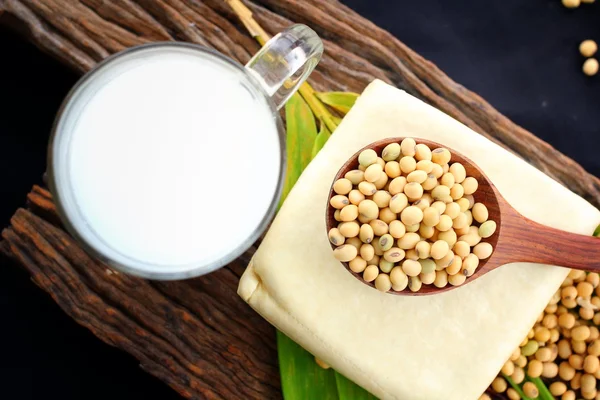Advantages of Soybeans for Women’s Health – Soybeans are a diverse and nutrient-rich food source that offer numerous benefits for women’s health. From addressing menopause symptoms to providing essential nutrients, soybeans play a crucial role in promoting overall well-being for females.
Nutritional benefits of soybeans
According to USDA Soybeans are an excellent source of essential nutrients such as protein, fiber, B vitamins, and minerals. A half-cup serving of cooked soybeans provides approximately 15 grams of protein, 5 grams of fiber, and significant amounts of folate, magnesium, thiamine, riboflavin, pyridoxine, potassium, and iron, making them a valuable addition to a balanced diet. These nutritional components are particularly important for female health, supporting energy levels, hormone balance, and overall vitality.

Impact of soy consumption on menopause symptoms
Recent studies have highlighted the potential benefits of soy consumption for women experiencing menopause symptoms. Soy foods have been found to alleviate menopausal symptoms, including hot flashes, thereby improving the overall quality of life for women going through this transition. The phytonutrients present in soy help to counter inflammation and enhance cardiovascular, nerve, and muscle function, contributing to better overall health during menopause.
ALSO READ: Hot Flashes During Period in 20s: Causes and Treatment
Historical significance of soybeans
Soybeans have a rich historical significance, particularly in Asian cultures where they have been a staple food for centuries. From their origins in China to their widespread cultivation in Japan, Europe, and the United States, soybeans have played a significant role in human nutrition and agriculture. Understanding the historical context of soybeans provides insight into the longevity of their use and their enduring relevance in modern diets.
Culinary Uses of Soybeans
Soybeans offer a wide array of culinary options, ranging from tofu and tempeh to natto and edamame. Understanding the different types of soy foods and their culinary uses can help women incorporate these nutritious options into their daily meals, enriching their diet with diverse flavors and textures.
Different types of soy foods
Soy foods encompass a variety of products, each with distinct characteristics and culinary uses. Tofu, known for its versatility, comes in different textures such as firm and silken, making it suitable for various cooking methods. Tempeh, with its unique nutty flavor, can be used as a meat substitute in various dishes. Natto, a fermented soybean dish, offers a pungent flavor and sticky texture, while edamame, young green soybeans, provides a delightful and nutritious snack.
Culinary uses of tofu, tempeh, natto, and edamame
Tofu can be grilled, sautéed, or used in soups and smoothies, offering a versatile option for incorporating plant-based protein into meals. Tempeh’s crumbly texture makes it suitable for use in ground meat alternatives or as a high-protein snack. Natto, often served with rice and soy sauce, offers a unique flavor profile and a dose of beneficial probiotics. Edamame, whether served in the pod or shelled, provides a convenient and nutritious snack or side dish.
Taste and cooking methods of soy-based products
Many soy-based products have subtle flavors and can take on the tastes of the ingredients they are cooked with, making them adaptable to a wide range of recipes. From savory to sweet dishes, soy-based products blend well with different culinary styles, offering a delicious and nutritious addition to various cuisines. Understanding the taste and cooking methods of soy-based products can empower women to explore new culinary possibilities and enjoy the benefits of soy in their diet.
Health Effects of Soy Consumption for Women
The consumption of soy has been associated with various health effects for women, from potential benefits in reducing breast cancer risk to its impact on kidney health. Understanding these effects can help women make informed decisions about incorporating soy into their diet and managing their overall health.
Impact on breast cancer risk
Contrary to previous concerns, current research has shown that soy consumption does not increase the risk of breast cancer. In fact, some studies have suggested a potential reduction in breast cancer risk associated with the consumption of soy foods. Additionally, after a diagnosis of breast cancer, including soy in the diet may help with survival and reduce the risk of cancer recurrence, indicating potential protective effects of soy for breast health.
DON’T MISS: Statins may reduce breast cancer mortality rates – Study reveals
Relationship to kidney health
For individuals with chronic kidney disease, incorporating soy protein into a low-protein diet can offer health benefits. Consulting with a registered dietitian nutritionist can provide personalized guidance on incorporating soy into a kidney-friendly diet, underscoring the potential role of soy in supporting kidney health for women.
Use of isoflavone supplements and potential risks
While isoflavones in soy foods are generally safe in the diet, caution is advised when considering isoflavone supplements, especially for women experiencing menopausal symptoms. Supplemental isoflavones, such as those derived from red clover, may pose certain risks, including a potential increase in breast cancer risk and effects on thyroid function. Understanding the potential risks associated with isoflavone supplements can help women make informed choices about their use.
Soybeans and Other Health Benefits
In addition to their impact on menopause symptoms and breast cancer risk, soybeans offer a range of other health benefits that affect various aspects of women’s well-being, including skin health and disease prevention.
Benefits for skin health
While research has primarily focused on the positive skin protection benefits of soy-containing skin care products, the overall nutritional value of soybeans makes them a valuable addition to an individual’s eating pattern. The presence of healthy fats, protein, and essential nutrients in soybeans contributes to overall good health, which can reflect in skin health as well.
Role in preventing various diseases
Soy consumption has been linked to a reduced risk of developing coronary heart disease and certain types of cancer, including breast, endometrial, and bladder cancer. Additionally, the nutritional profile of soybeans, including their protein, fiber, and phytonutrient content, contributes to their potential role in promoting overall health and reducing the risk of certain diseases for women.
Summary of the nutritional value and overall benefits of soybeans
The remarkable soybean offers a comprehensive nutritional profile, including essential nutrients such as protein, fiber, B vitamins, iron, and other key minerals. Whether consumed in the form of whole soybeans, tofu, tempeh, or other soy-based products, soybeans contribute to a balanced and healthful diet for women. Incorporating soybeans into one’s eating pattern can offer a range of health benefits, supporting overall wellness and vitality for females.
FAQs
What are the nutritional benefits of soybeans for females?
Soybeans provide essential nutrients such as protein, fiber, B vitamins, and minerals, which are crucial for supporting energy levels, hormone balance, and overall vitality in females.
How can soybeans contribute to female reproductive health?
Soybeans contain phytonutrients that have been associated with alleviating menopausal symptoms, potentially supporting female reproductive health during the menopausal transition.
In what ways do soybeans support bone health in females?
The presence of nutrients such as calcium, magnesium, and protein in soybeans contributes to bone health, potentially reducing the risk of osteoporosis and supporting bone strength in females.
What are the potential benefits of soybeans for managing menopausal symptoms in females?
Soybeans have been found to alleviate menopausal symptoms, including hot flashes, thereby improving the overall quality of life for women undergoing the menopausal transition.
In conclusion, the inclusion of soybeans in a woman’s diet offers a myriad of benefits, ranging from nutritional value to potential health effects. Understanding the diverse advantages of soybeans for female health can empower women to make informed choices about their dietary intake and overall well-being.
To understand more, read : 15 Soybean Benefits for Females’ Health









